In an era, racing toward electrification, certain names ring louder than others. As Tesla owns the headlines in the West, in the East — and, more and more, globally — it's BYD, or Build Your Dreams, forging quietly its revolution electric. From humble origins as a rechargeable battery manufacturer to the world's dominant EV maker, BYD's ascent is not only motivational — it's rewriting the automotive innovation playbook.
But how did BYD shift from making phone batteries to building some of the most advanced electric cars on the planet today? What's so unique about their strategy? Where are they headed next? Buckle up and take a road trip through the history, present day, and future of BYD — the company that's rewriting the book on building your dreams.
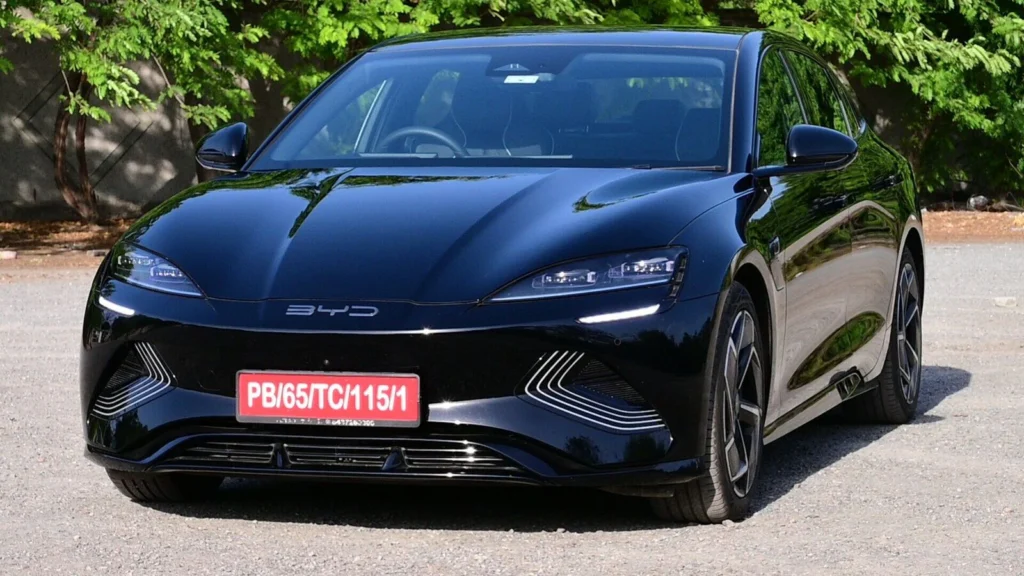 Given its nickname as the "Model 3 Killer," the Seal is futuristic, sophisticated, and utilitarian. With a 0–100 km/h acceleration of just 3.8 seconds, a top range of 700 km, and stunning looks, it is a combination of performance and comfort.
Given its nickname as the "Model 3 Killer," the Seal is futuristic, sophisticated, and utilitarian. With a 0–100 km/h acceleration of just 3.8 seconds, a top range of 700 km, and stunning looks, it is a combination of performance and comfort.
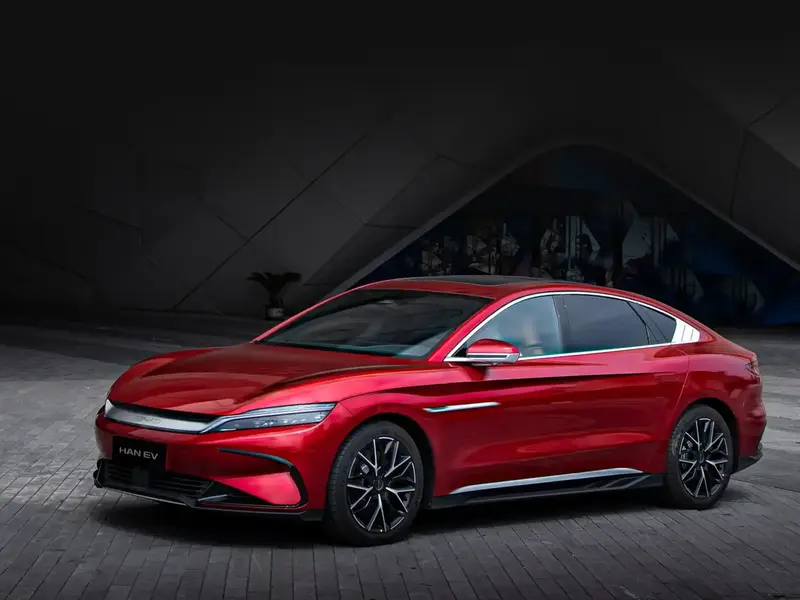 The Han is BYD's answer to luxury. Featuring intelligent interiors, voice command, and a Blade Battery that can charge quickly, it can rival German sedans at a fraction of the price.
The Han is BYD's answer to luxury. Featuring intelligent interiors, voice command, and a Blade Battery that can charge quickly, it can rival German sedans at a fraction of the price.
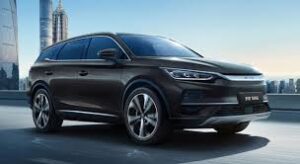 A plug-in hybrid seven-seater that combines versatility with sustainability. Ideal for family use, it's already making waves in Europe and South America.
A plug-in hybrid seven-seater that combines versatility with sustainability. Ideal for family use, it's already making waves in Europe and South America.
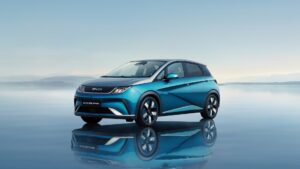 Inexpensive, stylish, and eco-friendly — these are built for the city commuter. The Atto 3 has been a huge hit in countries like India, Australia, and Norway.
Inexpensive, stylish, and eco-friendly — these are built for the city commuter. The Atto 3 has been a huge hit in countries like India, Australia, and Norway.
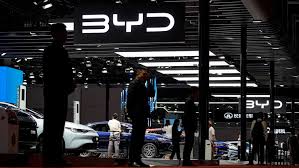 What truly sets BYD apart is its electrification across multiple sectors. It's not just cars — it's total green mobility.
1. Electric Buses and Trucks
BYD is the world leader in electric commercial vehicles, like buses, garbage trucks, delivery vans, and more. These have reduced city emissions in over 50 nations.
2. Monorails and SkyRail
Yes, BYD makes electric monorails. While traffic and pollution strangle city hubs, BYD's SkyRail is an affordable, electric mass transit solution.
3. Energy Storage Systems
BYD also manufactures solar panels and home/commercial battery storage units — essentially Tesla Powerwall's behind-the-scenes, efficient sibling.
4. Semiconductor Design
As EVs more and more rely on software, BYD is investing heavily in its own semiconductors, further establishing its autonomous ecosystem.
What truly sets BYD apart is its electrification across multiple sectors. It's not just cars — it's total green mobility.
1. Electric Buses and Trucks
BYD is the world leader in electric commercial vehicles, like buses, garbage trucks, delivery vans, and more. These have reduced city emissions in over 50 nations.
2. Monorails and SkyRail
Yes, BYD makes electric monorails. While traffic and pollution strangle city hubs, BYD's SkyRail is an affordable, electric mass transit solution.
3. Energy Storage Systems
BYD also manufactures solar panels and home/commercial battery storage units — essentially Tesla Powerwall's behind-the-scenes, efficient sibling.
4. Semiconductor Design
As EVs more and more rely on software, BYD is investing heavily in its own semiconductors, further establishing its autonomous ecosystem.
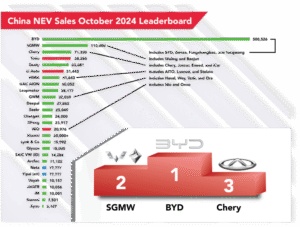 BYD's success is no accident. It's the result of acute vision, long-term strategy, and relentless innovation. Here are some of the key factors:
Affordability Meets Quality: BYD makes EVs that are good-looking, state-of-the-art, and relatively more affordable than their Western counterparts.
BYD's success is no accident. It's the result of acute vision, long-term strategy, and relentless innovation. Here are some of the key factors:
Affordability Meets Quality: BYD makes EVs that are good-looking, state-of-the-art, and relatively more affordable than their Western counterparts.
What is BYD?
Founded in 1995 by Wang Chuanfu, a rural-born, self-made chemist, BYD started out as a manufacturer of rechargeable batteries, with clients including Nokia, Motorola, and Samsung. A decade later, it had become the world's largest producer of mobile phone batteries. But Chuanfu's ambitions went beyond power cells. He saw a future when batteries charged not only phones — but cars, cities, and civilizations. And in 2003, BYD made a gamble: it ventured into the automobile industry by acquiring Qinchuan Auto, a stale Chinese automaker. Skeptics derided. A battery company making cars? Outrageous. Flash forward to today — BYD is the biggest electric vehicle manufacturer in the world, outselling Tesla late in 2023. And this is just the start.Where Did the Journey Start?
The early 2000s were all about gasoline-guzzling vehicles and green complacency. But BYD did differently. It launched its first plug-in hybrid, the BYD F3DM, in 2008 — years before most others in the world were serious about EV development. The huge pivot came in 2008, when Warren Buffett, billionaire investor, purchased a 10% interest in BYD for $230 million through Berkshire Hathaway. Not only did that lend BYD to global credibility, but it was also a huge financial success — expanding into billions of values and putting BYD on the global EV map.How Does BYD Make a Better EV?
Unlike most automakers, BYD's strength is vertical integration. Essentially, it produces practically everything in-house — batteries, motors, semiconductors, even the car's design. This has the following benefits:- Cost Efficiency: BYD is not bogged down by supply chain issues that plague rivals.
- Speed of Innovation: With full control of R&D, BYD can bring new technology to the market faster.
- Battery Dominance: BYD's Blade Battery is one of the safest, most powerful lithium iron phosphate (LFP) batteries in the world — with superior heat resistance, longer cycle life, and no compromise on range.
What Are BYD's Flagship Models?
-
BYD Seal (Sedan)
 Given its nickname as the "Model 3 Killer," the Seal is futuristic, sophisticated, and utilitarian. With a 0–100 km/h acceleration of just 3.8 seconds, a top range of 700 km, and stunning looks, it is a combination of performance and comfort.
Given its nickname as the "Model 3 Killer," the Seal is futuristic, sophisticated, and utilitarian. With a 0–100 km/h acceleration of just 3.8 seconds, a top range of 700 km, and stunning looks, it is a combination of performance and comfort.
-
BYD Han (Luxury Sedan)
 The Han is BYD's answer to luxury. Featuring intelligent interiors, voice command, and a Blade Battery that can charge quickly, it can rival German sedans at a fraction of the price.
The Han is BYD's answer to luxury. Featuring intelligent interiors, voice command, and a Blade Battery that can charge quickly, it can rival German sedans at a fraction of the price.
-
BYD Tang (SUV)
 A plug-in hybrid seven-seater that combines versatility with sustainability. Ideal for family use, it's already making waves in Europe and South America.
A plug-in hybrid seven-seater that combines versatility with sustainability. Ideal for family use, it's already making waves in Europe and South America.
-
BYD Dolphin & BYD Atto 3 (Compact EVs)
 Inexpensive, stylish, and eco-friendly — these are built for the city commuter. The Atto 3 has been a huge hit in countries like India, Australia, and Norway.
Inexpensive, stylish, and eco-friendly — these are built for the city commuter. The Atto 3 has been a huge hit in countries like India, Australia, and Norway.
Where in the World is BYD Conquering?
The Chinese may have done it, but the world is where BYD is conquering.- Europe: With mounting EV incentives and green initiatives, BYD has launched several models in Germany, France, the UK, and Norway. It has also revealed a manufacturing unit in Hungary.
- Latin America: BYD taxis and buses are already ubiquitous in Brazil, Colombia, and Chile. It's also building electric rail solutions in the region.
- Asia-Pacific: BYD is expanding market share in India, Australia, and Thailand at breakneck pace, especially in the mass-market EV segment.
- Africa & Middle East: BYD is emerging as the go-to choice for electric taxis and buses for nations that want to skip fossil fuels and jump-start into the future.
How Is BYD More Than Just a Car Company?
 What truly sets BYD apart is its electrification across multiple sectors. It's not just cars — it's total green mobility.
1. Electric Buses and Trucks
BYD is the world leader in electric commercial vehicles, like buses, garbage trucks, delivery vans, and more. These have reduced city emissions in over 50 nations.
2. Monorails and SkyRail
Yes, BYD makes electric monorails. While traffic and pollution strangle city hubs, BYD's SkyRail is an affordable, electric mass transit solution.
3. Energy Storage Systems
BYD also manufactures solar panels and home/commercial battery storage units — essentially Tesla Powerwall's behind-the-scenes, efficient sibling.
4. Semiconductor Design
As EVs more and more rely on software, BYD is investing heavily in its own semiconductors, further establishing its autonomous ecosystem.
What truly sets BYD apart is its electrification across multiple sectors. It's not just cars — it's total green mobility.
1. Electric Buses and Trucks
BYD is the world leader in electric commercial vehicles, like buses, garbage trucks, delivery vans, and more. These have reduced city emissions in over 50 nations.
2. Monorails and SkyRail
Yes, BYD makes electric monorails. While traffic and pollution strangle city hubs, BYD's SkyRail is an affordable, electric mass transit solution.
3. Energy Storage Systems
BYD also manufactures solar panels and home/commercial battery storage units — essentially Tesla Powerwall's behind-the-scenes, efficient sibling.
4. Semiconductor Design
As EVs more and more rely on software, BYD is investing heavily in its own semiconductors, further establishing its autonomous ecosystem.
Why is BYD Winning?
 BYD's success is no accident. It's the result of acute vision, long-term strategy, and relentless innovation. Here are some of the key factors:
Affordability Meets Quality: BYD makes EVs that are good-looking, state-of-the-art, and relatively more affordable than their Western counterparts.
BYD's success is no accident. It's the result of acute vision, long-term strategy, and relentless innovation. Here are some of the key factors:
Affordability Meets Quality: BYD makes EVs that are good-looking, state-of-the-art, and relatively more affordable than their Western counterparts.
- Government Support: As a local company, BYD has been aided by Chinese subsidies and incentives — but with a twist: it has managed to scale up internationally.
- Battery Innovation: The Blade Battery is a game-changer. No thermal runaway, low degradation, and reasonable price -- it's ideal for the mass market.
- Diverse Portfolio: BYD is not putting all its eggs in one basket. From monorails to pickups, it's electrifying them all.
Challenges on the Road Ahead
Of course, the EV road is not smooth sailing.- Global Perception: Despite its innovation, BYD still suffers from the "Made in China" image in Western markets.
- Geopolitical Tensions: Trade tensions and tariffs, especially in Europe and the U.S., could limit expansion.
- Competition: With incumbent car makers like VW, GM, and Toyota finally upping the ante — and Tesla continuing to benefit from strong brand devotion — the battle is far from over.
What's Next for BYD?
Forward-thinking, BYD has three top priorities:- Solid-State Batteries: Rumor is that BYD may roll out cars with solid-state batteries in 2026 — a theoretical limit on energy density and safety.
- Global Production Factories: European, Latin American, and Southeast Asian factories are being built or planned.
- Luxury EV Sub-Brand — Yangwang: BYD recently unveiled its luxury brand Yangwang, complete with its futuristic design and prowess. The U8, a high-end off-road SUV that can float on water and swivel like a tank, has already created a viral sensation.
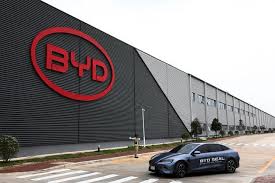
2 replies on “EV Vehicles by BYD: Changing the world with Electric innovation”